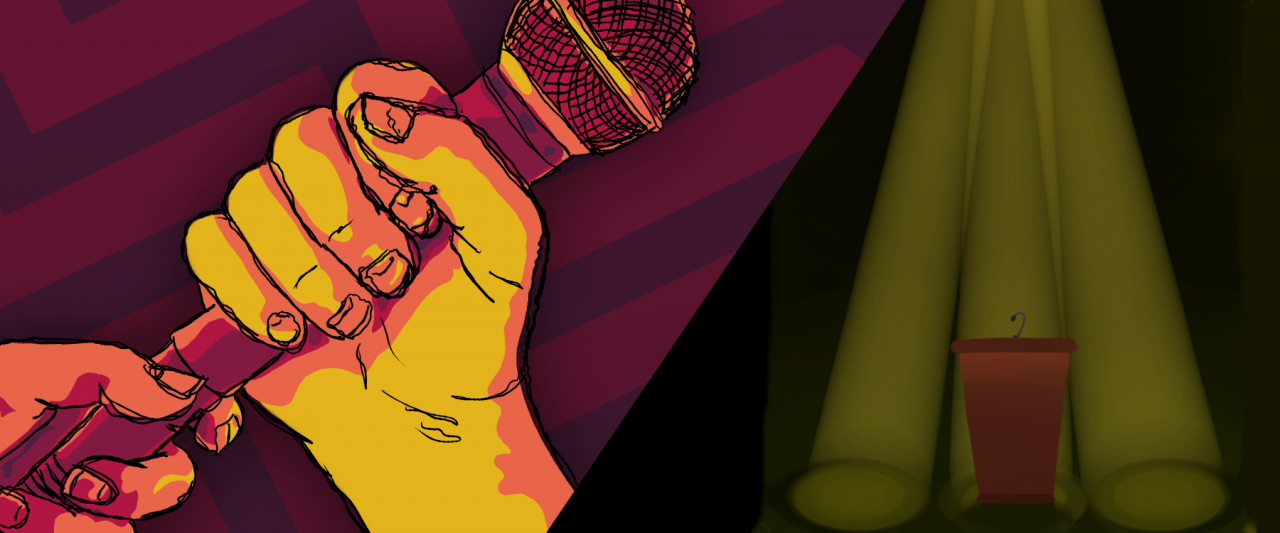Graphic by Alex Parris; Illustrations by Andrea Nebhut and Genevieve Humphreys
Two weeks ago, I wrote about the value of deplatforming oppressive speech in certain situations, including refusing to have speakers like far-right pundit Dinesh D’Souza on our campus. This column garnered a good amount of response, including a column last week from guest columnist Benjamin Collinger. While Collinger brings up some great points, I felt the need to expand on previous thoughts and clarify misconceptions about my argument.
First of all, I should better define what I meant by the specific types of speakers I am referring to. The idea of “hate speech” is not quite an accurate description of what I am arguing against, which is why I intentionally did not use it in my article (editorial staff later used it in subheadings, which I did not know about but should have caught). Collinger rightly points out that D’Souza never used the legal definition of hate speech, and I would agree. D’Souza never called for any specific acts of violence towards any ethnicity, or even towards immigrant populations.
But that is part of the problem: speakers like D’Souza deny the humanity of certain groups without ever crossing the line into inciting violence, which makes them so dangerous. People who hear and start to agree with his arguments start to justify dehumanization under the guise of a neutral political opinion. No, D’Souza did not fulfill any legal requirement of hate speech, but it is undeniable that he engaged in the active denial of human rights to undocumented immigrants. How is it any better than inciting violence to claim that certain groups do not deserve basic rights?
Collinger also brings up the potential strategical flaws in deplatforming these speakers since doing so would alienate those who agree with him and prevent them from being persuaded to vote a different way. While this makes sense from a political science point of view, we must also acknowledge the short-term real harm that these speakers can enact on underprivileged people in the United States. Hate crimes are on the rise and have been since around 2016, around the same time that far-right speakers and groups gained a lot of attention in the United States. While of course we cannot assign the blame for these trends to one speaker, I think we must acknowledge the privilege that enables us to debate about the value of “hearing both sides,” while thousands of people have to experience the real, violent effects of the narratives promoted by the most extreme of one of those sides.
Speaking of privilege, I must also explain that I never meant to imply that D’Souza and speakers like him were suppressing my speech personally. Alas, in the search for a catchy title (“Your free speech is denying mine”), I obfuscated my point, which is that some types of speech are inherently oppressive of others, and therefore, we cannot always claim that the “best” ideas will win. This is especially true when speeches like D’Souza rely on misinformation and fear that clouds rationality and persuades people to adopt dangerous narratives about certain groups. Yes, there will always be advocates, such as myself and immigrant justice groups, but the natural conclusion if we follow the logic of these groups is inherently different: mine argues for the respect of all peoples, while D’Souza’s argues for the systematic denial of rights to undocumented immigrants. In my utopia, all people may express their opinions, and in his, only those who are legal citizens may express theirs. This is what I mean by oppressive speech.
I also feel it is crucial that I emphasize that I never once argued for any limitations on the First Amendment, as multiple comments and emails implied. My argument solely focuses on the problems with legitimizing the types of speakers I’ve described. D’Souza can express his flawed points on the internet or on a street corner, where we can easily point out his inaccuracies with our own organizing and YouTube videos, but it is a totally different situation when we place D’Souza in Laurie Auditorium, the same stage where established speakers like David Cameron and Bernie Sanders have spoken. Doing so artificially inflates their legitimacy and places them squarely in the mainstream, making it difficult to distinguish speakers who come with good-faith arguments backed by facts from those who twist history in a way that supports their bigoted view of the world.
I would like to point out a case where deplatforming has been quite effective: not long after Milo Yiannopoulos visited our campus, he was forced to resign from the online publication where he worked, Breitbart News. Nowadays, he has been essentially eliminated from the public eye and is deeply in debt. “Two years of being no-platformed, banned, blacklisted and censored … has taken its toll,” Yiannopolous said in a statement on Facebook. If Collinger’s claims about deplatforming were true, we would have an underground Yiannopolous following on our hands, outraged at his unjust removal from public debates. Instead, we as a society have deemed his ideas not worthy of legitimate platforms and have moved on. I am not deluded enough to think that this should happen to everyone I disagree with. But I do think it is worth evaluating which speakers are actually here to share their ideas and which are worth moving on from.





Hadding Scott • Mar 1, 2019 at 1:27 am
“that D’Souza never used the legal definition of hate speech”
THERE IS NO SUCH THING IN THE UNITED STATES.